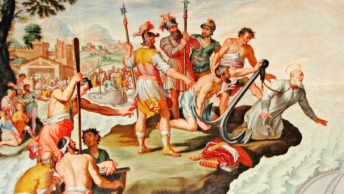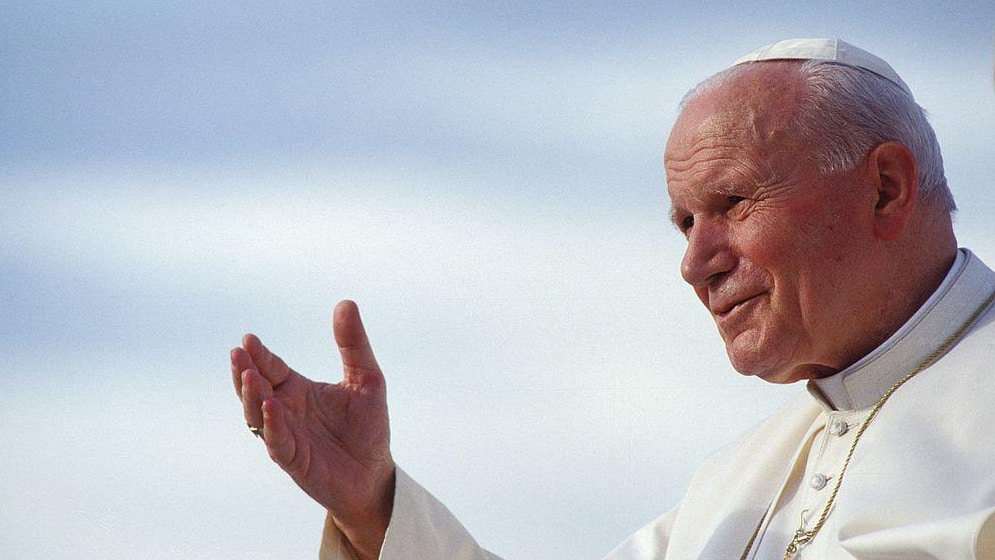Once upon a time two very good and holy men who lived in the same town died on the exact same day. They had never met during their lifetimes—for one was quite poor, and had lived in the ghetto, or rundown section of town, and the other was very rich, and had dwelled in a wealthy neighborhood. Because both men, according to their circumstances, had lived out the Gospel, they both arrived together at the gates of Heaven, where St. Peter was waiting for them. Ignoring the poor man, Peter welcomed his rich companion with open arms. A red carpet was rolled out, angels played trumpets, and a lavish dinner was held in his honor. The poor man was stunned by all this, and barely managed to slip in before the gates of Heaven closed. He thought, “This doesn’t make sense! I was holy on earth, despite my very hard life, so I was expecting a wonderful welcome and a great reward—but this is turning out to be just like on earth; the rich man gets everything his own way. Everyone is paying attention to him, and angels and saints are making speeches in his honor, while I’m completely ignored. This isn’t fair!”
As the rich man’s welcoming dinner drew to a close, the poor man decided he was going to tell off St. Peter. He approached him and loudly reminded Peter that he was here, too—so why wasn’t he welcomed with honor? St. Peter apologized profusely for forgetting about him, and—seeing his visitor was still very angry—told him that he too had a heavenly mansion, and that it was much nicer than that reserved for the rich man, plus it was very close to the throne of God, whereas the rich man’s was in the outer circle. The poor man objected, “All right, that’s fine—but why wasn’t I welcomed with open arms and a trumpet fanfare and a lavish banquet like my townsman? It isn’t fair!” St. Peter put his arm around him and said, “I know, I know, but you have to understand: people like you enter Heaven every day, but do you know how long it’s been since a wealthy person like him got in here?” (Megan McKenna, Parables: The Arrows of God, pp. 113-115). As Jesus says, it’s hard for the rich to enter the Kingdom of God. The values of Heaven are quite different from those of this world—and the way we live shows where our allegiance lies.
We are called to set aside human wisdom and instead rely on the ways of God. The Letter to the Hebrews (4:12-13) tells us that nothing is concealed from God; rather, “everything is naked and exposed to the eyes of Him to Whom we must render an account.” God is able to see things are they truly are; wisdom means asking for His help so that we may do the same. The Book of Wisdom (7:7-11) asserts that wisdom is far more valuable than gold or silver, far more useful than power or glory. All these things pass away, but wisdom helps prepare us for the life to come; it enables us to recognize God’s values, and live accordingly. The Gospel of Mark (10:17-30) provides a powerful illustration. A wealthy man who had carefully kept all the rules of his religion approached Jesus. The man’s culture would have said, “There, you see: because this man followed the commandments, God blessed him with wealth.” Our culture would say, “The man’s a good citizen; he’s kept all the rules and hasn’t hurt anyone. What more can you ask?” Jesus, however, took a very different approach. In effect He was saying, “I give you credit for what you’ve done so far, but it’s not enough. Sure, you’ve kept the rules, but how have you helped people? You’ve acquired your wealth honestly, but how have you used it to benefit others? You can’t be My follower merely by fulfilling a few basic requirements; you have to make a true commitment to Me.” The man went away sad, for he wasn’t expecting to hear anything like this. The apostles weren’t expecting to hear this, either; they assumed wealth was always a blessing, and an automatic sign of God’s favor. Jesus thereupon explained that their worldly understanding was wrong; happiness and blessedness come not from earthly success, but from being open and responsive to God’s grace.
On Mission Sunday, we are asked to offer our contributions to support the Church’s missionary activities throughout the world. From a worldly point of view, objections might be raised against this—but these objections would be wrong. Someone might say, “Why should the Church impose its values on people who know nothing about God? Why doesn’t it just leave them alone?” Very simply, Christ told His followers to share the Gospel—for only this can prepare them for judgment and the life to come. Refusing to share it is one of the worst things we could do. Some might claim, “The Church should limit itself to helping people’s physical needs, instead of preaching the Gospel.” However, while acts of charity are important, their effect is temporary; people need to hear the Gospel in order to be prepared for eternity. Others might object, “We’ve done enough already; our country has defended freedom and liberated nations from tyranny, while helping millions of people in need.” That’s true, but it’s not enough. God hasn’t stopped blessing us, so we have no reason to stop sharing our blessings with those in need. Still others might claim, “We don’t have enough to take care of ourselves and help other people, too.” However, this attitude overlooks the fact that God always rewards those who are generous in His Name; the more we give, the more we receive.
Giving to the missions is only one of many Christian activities and values that make no sense from a worldly perspective. Loving our enemies, forgiving those who wrong us, praying for our persecutors, being generous in response to the needs of others, and placing God’s will ahead of our own, are all downright foolish—or at least highly questionable—according to worldly standards. God’s wisdom, however, presents them as the right thing to do. It’s often the case that the rich have a much harder time entering Heaven than do the poor; it’s not easy to surrender completely to God in the midst of material plenty and self-sufficiency—but with the help of His grace, it is possible. This world’s blessings will assist us in entering the Kingdom only if we freely share them with those in need. If not, money, power, popularity, talent, and status will prove to be a hindrance and even a curse. If we truly wish to share in Christ’s Kingdom, we must show it by our use of all that the Lord has entrusted to us.








